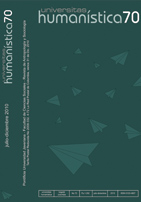Abstract
This paper addresses the discourse conflicts concerning development and the social issue, between the government elites and the power groups during post-Peronist developmentalism era in Argentina. Because of space limitations emphasis will be made on the Onganía’s government. Governmentality crisis faced during that period can be explained on the grounds of the difficulty elites in power had to come to an agreement on a hegemonic discourse concerning those issues, as it is argued here. The empirical analysis will show a constant: permanence in time of a liberal narrative against any effort of state regulation and the failed attempt to create an alternative narrative through the development significant.
This journal provides immediate open access to its content on the principle that making research freely available to the public, encourages greater global exchange of knowledge.
The journal Universitas Humanística is registered under a Creative Commons Attribution 4.0 International Public License. Thus, this work may be reproduced, distributed, and publicly shared in digital format, as long as the names of the authors and Pontificia Universidad Javeriana are acknowledged. Others are allowed to quote, adapt, transform, auto-archive, republish, and create based on this material, for any purpose (even commercial ones), provided the authorship is duly acknowledged, a link to the original work is provided, and it is specified if changes have been made. Pontificia Universidad Javeriana does not hold the rights of published works and the authors are solely responsible for the contents of their works; they keep the moral, intellectual, privacy, and publicity rights.
Approving the intervention of the work (review, copy-editing, translation, layout) and the following outreach, are granted through an use license and not through an assignment of rights. This means the journal and Pontificia Universidad Javeriana cannot be held responsible for any ethical malpractice by the authors. As a consequence of the protection granted by the use license, the journal is not required to publish recantations or modify information already published, unless the errata stems from the editorial management process. Publishing contents in this journal does not generate royalties for contributors.


